


|
1328 |
Roger Mortimer acknowledges the independence of Scotland by the Treaty of Northampton, but on coming to power in 1330 Edward seeks to restore his authority north of the border.
|
|
1330 |
The Italian poet Francesco Petrarch begins writing his Il Canzoniere (the Songbook), a set of love lyrics which were to have a profound influence on the poetry of the Renaissance.
|
|
1333 |
Edward III defeats the Scots at the Battle of Halidon Hill and gains the southern part of the country, but with the outbreak of war with France, further action is limited.
|
|
1334
1336 |
In Japan, civil war breaks out between rival “Emperors” at the courts of Yoshino and Kyoto. Peace is finally restored in 1392, but, in the meantime, local warlords gain much power.
|
|
1338 |
By the Declaration of Rhens, and later, the Golden Bull of 1356, the electors of the Holy Roman Empire claim that the Pope has no jurisdiction over the election of a new emperor.
|
|
1339
1340 |
In the first engagement of the war, the English fleet, with Edward in attendance, wins the Battle of Sluys off the Flemish coast. The French navy is virtually destroyed.
The Sultan of Morocco, Abu al-
|
|
1345 |
Under Orhan the Ottoman Turks establish a military stronghold on the Gallipoli peninsula. From this European foothold they subdue the Byzantine Empire and move into the Balkans.
|
|
1346 |
Edward III and his son, Prince Edward, later known as the Black Prince, defeat the French at the Battle of Crécy and go on to capture the port of Calais the following year.
|
|
1347
1348 |
Edward III institutes the Most Noble Order of the Garter, the highest honour in the land, and makes the royal chapel at Windsor Castle into the centre for the new Order.
|
|
1353 |
One of the world’s literary masterpieces, Il Decameron, a collection of prose romances on a variety of subjects, is completed by the Italian poet and writer Giovanni Boccaccio.
The traveller Ibn Battuta returns to his native Morocco after thirty years, and gives an account of his 75,000 mile journey to the Middle and Far East, South East Asia, and Africa.
|
|
1356 |
|
|
1358 |
A revolt by French peasants north-
|
|
1360 |
The Treaty of Brétigny ends the first part of the Hundred Years' War. Edward gives up his claim to the French throne but retains, for the present at least, his land in southern France.
|
|
1362 |
The English poet William Langland writes his first version of Piers Plowman, in which he describes the poverty of the peasant, and condemns the social and moral evils of his day.
|
|
1363 |
One of the leading surgeons of the day, the Frenchman Guy de Chauliac, produces his Chirurgia magna (Great Surgery), a book which becomes a standard work on the subject.
|
|
1368 |
The Hanseatic League, a powerful confederation of cities trading in and around the Baltic, defeats the Danish army and forces the Danes to grant its members commercial privileges.
|
|
1370 |
The Massacre of Limoges by the Black Prince severely weakens England’s hold on its possessions in the south of France. The French now begin to recapture their lost land.
Tamerlane, the last great leader of the Mongols, becomes ruler of west Turkestan in Central Asia, and begins to make an empire which will stretch from India to the Mediterranean Sea.
The Chimu, a people living along the north coast of Peru, expand southwards, constructing a network of roads and irrigation canals, and building vast walled citadels.
|
|
1374 |
Edward III becomes ill and his fourth son, John of Gaunt, rules in his place. His blatant display of wealth and autocratic manner make him a target of discontent.
|
|
1375 |
At a Conference at Bruges, England and France declare a truce. By this time the only English possessions in France are Calais, Brest, Bordeaux and Bayonne.
|
|
1376
1377 |
John
Wycliffe, a teacher at Oxford
University, calls for church reform. In his treatise
Pope Gregory XI leaves Avignon and returns to Rome, thus ending the Babylonian Captivity. However, there then follows the Great Schism, (1378 R2), with papal courts at both Rome and Avignon.
Edward III, confused and ailing for a
number of years, dies at Sheen in Surrey. He is succeeded by his
ten-
|
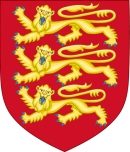





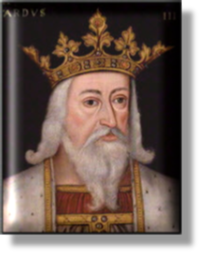 xxxxx
xxxxx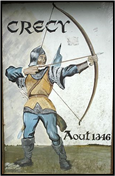
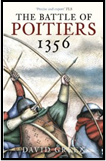 xxxxx
xxxxx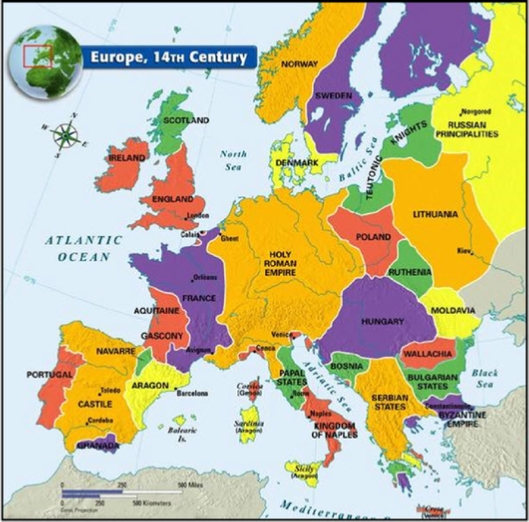
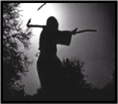 xxxxx
xxxxx The
Italian architect Giotto de Bondone designs the beautiful bell
tower (campanile) at Florence, known popularly as
The
Italian architect Giotto de Bondone designs the beautiful bell
tower (campanile) at Florence, known popularly as 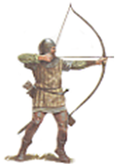 Edward,
having adopted the title of King of France and landed in the
Netherlands, moves his army into France, thus opening the first
offensive of the the
Edward,
having adopted the title of King of France and landed in the
Netherlands, moves his army into France, thus opening the first
offensive of the the 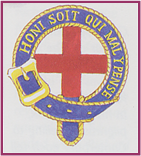 A
bubonic plague, originating from Asia and known as the
A
bubonic plague, originating from Asia and known as the  The
The
 The
The
 On
Civil Lordship
On
Civil Lordship